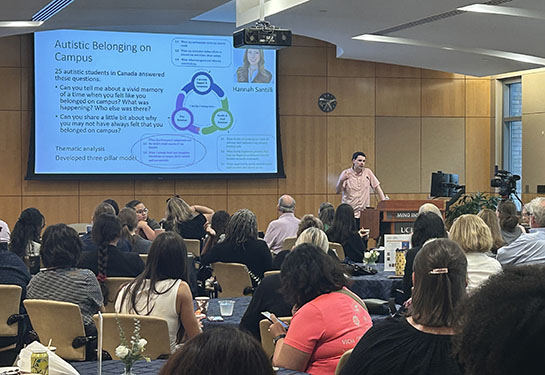UC Davis experts call for greater physician awareness and screening of fragile X-related conditions
Paper published in New England Journal of Medicine recommends testing for specific groups
UC Davis MIND Institute researchers Randi and Paul Hagerman are calling for increased awareness and screening for fragile X-associated conditions. In a new paper published in the New England Journal of Medicine, the husband-and-wife physician-scientists note that the group of genetic conditions is still not widely recognized by health care providers, despite decades of research.

In the paper, the Hagermans note that anyone with a diagnosis of autism or intellectual disability should be screened for fragile X. “Unfortunately, this isn’t happening consistently, even though it’s recommended by the leading medical organizations,” said Distinguished Professor Randi Hagerman, a developmental-behavioral pediatrician and MIND Institute founding medical director. “It’s a simple blood test, is usually covered by insurance or Medicaid/Medi-Cal and is absolutely necessary for these conditions.”
What is fragile X?
This group of genetic conditions is linked to changes in a gene called FMR1, located on the X chromosome. These changes range from a premutation (a smaller change) to a full mutation, with different health impacts.
The most well-known is fragile X syndrome, which is caused by the full mutation. It’s the most common inherited cause of intellectual disability and autism and affects learning, development and behavior.
“Despite the importance of fragile X syndrome, a remarkable number of physicians are unaware of its existence,” explained Distinguished Professor Paul Hagerman, who is in the Department of Biochemistry and Molecular Medicine.
Fragile X syndrome is more common in males than females. Additional characteristics can include social anxiety, sensory and sleep challenges, large ears and a long face and speech and language delays.
There are millions of people who have no idea that they carry the premutation.” —Randi Hagerman, distinguished professor, Department of Pediatrics
FXTAS, FXPOI and other fragile X-associated conditions
People with the premutation are considered carriers of fragile X.
“One in 150-200 women and 1 in 300-400 men in the general population are carriers of mutated forms of the gene,” Paul Hagerman said. Randi Hagerman added, “There are millions of people who have no idea that they carry the premutation.”
While many show no symptoms, some may develop health conditions later in life. These include:
- Fragile X-associated Tremor/Ataxia Syndrome (FXTAS): A neurological disorder that usually appears after age 50, especially in men. It causes tremors, balance problems, memory issues and sometimes symptoms similar to Parkinson’s disease. The Hagermans and their research teams discovered FXTAS at the MIND Institute in 2001 after realizing that many family members of fragile X syndrome patients had similar symptoms.
- Fragile X-associated Primary Ovarian Insufficiency (FXPOI): A condition affecting some women with the premutation, leading to irregular periods, early menopause and fertility challenges.
- Other Emerging Conditions: Researchers are also studying additional health conditions linked to the premutation, including anxiety, depression and autoimmune issues.
The Hagermans recommend in the paper that upon a fragile X syndrome diagnosis, providers get a full medical history of the family tree. Females with the premutation have a 50% chance of passing the mutation to each of their children. Males with the premutation will pass it to all of their daughters (and none of their sons).
The pair note that often the fragile X syndrome diagnosis leads to other diagnoses of related conditions for additional family members. “It spans generations,” Randi Hagerman said.
FXTAS can also look a lot like other disorders, which makes screening important, said Paul Hagerman. “When testing is done, older adults often find out that a prior diagnosis of Alzheimer’s or Parkinson’s may actually be FXTAS.”
The development of gene therapy approaches is proceeding at an incredibly rapid pace. I am most hopeful for targeted therapies for the fragile X family of conditions in the very near future.”—Paul Hagerman, distinguished professor, Department of Biochemistry and Molecular Medicine
Hope for treatments
There are no treatments specifically approved for fragile X syndrome, but the Hagermans note that several treatments have shown some promise. These include a cannabidiol gel and zatolmilast, a medication that showed improvement in language and daily function in a small trial. It is being tested in both adults and children.
Metformin, a traditional diabetes treatment, is also being tested to treat fragile X syndrome. “It’s showing efficacy, particularly in children, and we’ll be publishing research about that before the end of the year,” Randi Hagerman said.
The MIND Institute has been a testing site for all three treatments.
What most excites Paul Hagerman is gene therapy, his area of study. “The development of gene therapy approaches is proceeding at an incredibly rapid pace. I am most hopeful for targeted therapies for the fragile X family of conditions in the very near future.”
Learn more about fragile X research and how to make an appointment at the UC Davis MIND Institute.
The UC Davis MIND Institute in Sacramento, Calif. is a unique, interdisciplinary research, clinical, and education center committed to deepening scientific understanding of autism and other neurodevelopmental conditions. It is a highly collaborative center, bringing together families, researchers, clinicians, community leaders and volunteers with the common goal of developing more personalized, equitable, and scientifically proven systems of support and intervention. The institute has major research efforts in autism, fragile X syndrome, chromosome 22q11.2 deletion syndrome, attention-deficit/hyperactivity disorder (ADHD) and Down syndrome. More information about the institute and its Distinguished Lecturer Series, including previous presentations in this series, is available on the Web at https://health.ucdavis.edu/mind-institute/.





